What is Journaling? A Beginner's Guide to Starting Your Personal Growth Journey

In our fast-paced digital world, the simple act of putting pen to paper has become something of a lost art. Yet journaling remains one of the most powerful tools for self-discovery, stress reduction, and personal growth. Whether you're looking to process complex emotions, track your progress toward goals, or simply document your daily experiences, journaling offers a private space for reflection that can transform your relationship with yourself and the world around you.
If you've ever wondered about starting a journal but felt unsure where to begin, you're in the right place. This guide will walk you through everything you need to know about journaling—from understanding its benefits to establishing a sustainable practice that works for your lifestyle.
What Exactly Is Journaling?
At its core, journaling is the practice of regular writing to explore thoughts, feelings, and experiences. Unlike diary-keeping, which typically focuses on recording daily events, journaling often involves deeper reflection, analysis, and intentional growth. It's a conversation with yourself on paper—a way to externalize your internal world and gain perspective on your life journey.
Journaling can take countless forms. Some people prefer stream-of-consciousness writing, where thoughts flow freely without structure. Others might use prompts, lists, or specific formats to guide their practice. There's no single "right way" to journal—the most effective approach is the one that resonates with you personally and keeps you coming back to the page.
The beauty of journaling lies in its accessibility and flexibility. You don't need expensive tools or extensive training to begin—just a pen, paper, and a few minutes of your day. Some practitioners prefer traditional notebooks, while others embrace digital platforms or specialized journaling apps. Whether you write daily, weekly, or only when inspiration strikes, consistency tends to yield the greatest benefits. Many successful journalers recommend establishing a ritual around the practice—perhaps with a favorite beverage, a comfortable setting, or a specific time of day—to signal to your brain that it's time for reflection.
The Science Behind Journaling
Journaling isn't just a feel-good activity—it's backed by substantial scientific research. Studies have shown that regular expressive writing can improve physical and mental health outcomes. When we write about our experiences, especially difficult ones, we engage both hemispheres of the brain. The act of translating emotions into words helps process traumatic events and reduces their impact on our nervous system.
The neurological mechanisms behind journaling's effectiveness are particularly fascinating. When we write about emotional experiences, we activate the cerebral cortex, which helps regulate and process these emotions. Simultaneously, the amygdala—our brain's alarm system for stress—shows decreased activity. This dual process creates what scientists call "emotional regulation," allowing us to gain cognitive control over our emotional responses. Additionally, the act of writing engages working memory, which helps organize thoughts and create coherent narratives from scattered experiences. Over time, this repeated process strengthens neural pathways associated with emotional resilience and cognitive flexibility, essentially "rewiring" the brain toward more adaptive patterns of thinking.
The Benefits of Regular Journaling
The rewards of maintaining a journaling practice extend far beyond the immediate emotional release. Regular journaling creates a foundation for meaningful personal growth across multiple dimensions of life. As you develop the habit, you'll likely notice subtle shifts in how you process experiences and relate to yourself.
Many long-term journalers report that their practice becomes increasingly valuable over time, as patterns emerge and personal insights accumulate. The journal becomes not just a record of your life but a tool for intentionally shaping it.
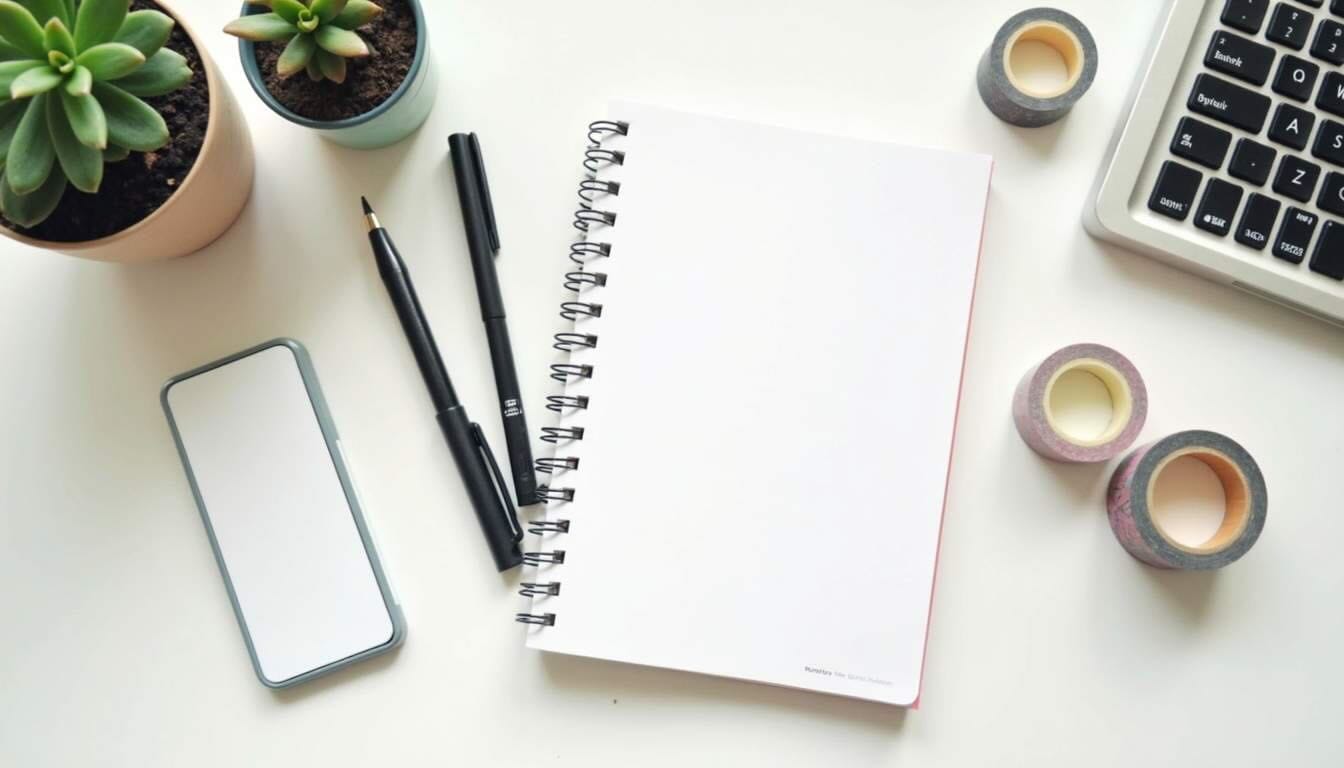
Emotional Processing and Mental Clarity
One of journaling's most immediate benefits is its ability to help us process complex emotions. When feelings like anger, grief, or confusion feel overwhelming, writing provides a safe outlet. The page doesn't judge or interrupt—it simply receives. This externalization often leads to surprising insights and emotional relief.
Beyond emotional processing, journaling creates mental clarity. The act of articulating vague thoughts forces us to organize them, revealing connections we might otherwise miss. Many people report that solutions to persistent problems often emerge during journaling sessions, as if the act of writing unlocks creative problem-solving abilities.
Goal Setting and Achievement
Journals make excellent companions for goal-setting and tracking. Writing down aspirations makes them concrete and increases commitment. Regular reflection on progress helps identify obstacles and celebrate victories, however small. Research suggests that people who write down their goals are significantly more likely to achieve them than those who don't.
The journal also serves as a record of growth over time. Looking back on earlier entries often reveals how far you've come—progress that might otherwise go unnoticed in the day-to-day experience of life. This documented evidence of personal development can provide motivation during challenging periods.
Improved Self-Awareness and Relationship Skills
Regular reflection naturally builds self-awareness—the foundation of emotional intelligence. As patterns in your thoughts, feelings, and behaviors become visible on the page, you gain insight into your authentic needs, values, and triggers. This self-knowledge translates into more intentional choices and greater alignment between your actions and deeper values.
Interestingly, this increased self-awareness often improves relationships with others. By processing emotions privately first, many journalers find they communicate more clearly and respond rather than react in interpersonal situations. The practice creates a buffer between stimulus and response, expanding your capacity to choose how you engage with others.
The Digital Revolution: From Paper to Pixels
The practice of journaling has undergone a significant transformation in recent years, shifting from traditional pen-and-paper methods to digital platforms. This evolution began with basic note-taking apps and has blossomed into a diverse ecosystem of specialized journaling applications designed for smartphones and tablets. The convenience of having your journal always accessible in your pocket has democratized the practice, making it easier to capture thoughts, photos, and experiences in the moment.
What's particularly exciting is how artificial intelligence is now enhancing the journaling experience. AI-powered apps can analyze your entries to identify emotional patterns, suggest personalized prompts based on your writing history, and even generate insights about your mood trends over time. Some platforms offer speech-to-text capabilities for those who prefer verbal processing, while others use machine learning to organize and categorize your entries automatically.
Despite these technological advances, one persistent challenge remains: finding time for consistent journaling in our busy lives. Many people struggle to maintain a regular practice amidst work demands, family responsibilities, and the general pace of modern life. This time constraint has driven innovation toward more efficient, frictionless journaling solutions that deliver benefits without requiring extensive time commitments.

Getting Started: Essential Supplies
One of journaling's greatest advantages is its accessibility—you need very little to begin. The essentials are simple: something to write with and something to write on. However, thoughtfully selecting your materials can enhance the experience and increase your likelihood of maintaining the practice.
Remember that your journaling supplies should feel inviting and practical for your lifestyle. The "perfect" journal is simply the one you'll actually use.
Choosing Your Journal
The physical journal you select matters more than you might think. Consider factors like size (will you carry it with you?), binding (does it lay flat when open?), paper quality (do you mind bleed-through?), and structure (lined, blank, dotted, or guided prompts?). Some people prefer beautiful, high-quality journals that feel special to use, while others find that simple notebooks reduce the pressure to create "worthy" content.
Digital journaling is also a valid option. Apps like Day One, Journey, and Penzu offer password protection, search capabilities, and the ability to include photos or voice recordings. The best choice depends on your personal preferences—many people find that physically writing by hand creates a different, more reflective experience than typing, but digital tools offer convenience and additional features.
Writing Instruments
Don't underestimate the impact of your writing tool on the journaling experience. A pen that flows smoothly across the page can make writing physically pleasurable, encouraging longer sessions. Experiment with different options—ballpoint, gel, fountain pens, or even colored markers—to find what feels best for your hand and writing style.
Some journalers enjoy having a dedicated "journal pen" that signals to the brain it's time for reflection. Others prefer variety, using different colors to track moods or types of entries. There's no right answer—only what enhances your personal practice.
Journaling Methods and Approaches
The beauty of journaling lies in its flexibility. There are countless approaches to choose from, and many people develop hybrid methods that suit their specific needs. As you explore different techniques, pay attention to which ones energize you and which feel like obligations. Your journaling practice should serve you—not the other way around.
Don't be afraid to experiment and adapt. Many experienced journalers find their approach evolves over time as their needs and interests change.
Free Writing
Perhaps the most straightforward approach is free writing—setting a timer and writing continuously without stopping to edit, judge, or even think too carefully about what comes next. The goal is to bypass your internal censor and access thoughts and feelings that might otherwise remain hidden. Julia Cameron's "Morning Pages" is a popular version of this method, involving three pages of longhand writing first thing in the morning.
Free writing can feel challenging at first. Many people worry about "doing it wrong" or finding themselves with nothing to say. The key is persistence—keep your hand moving across the page even if you're just writing "I don't know what to write" repeatedly. Eventually, something genuine will emerge.
Structured Journaling
If the blank page feels intimidating, structured journaling offers helpful scaffolding. This might include guided journals with pre-written prompts, specific formats like bullet journaling (which combines planning, tracking, and reflection), or frameworks like gratitude journaling (recording things you're thankful for) or decision journals (documenting important choices and their outcomes).
Many people find that structure helps maintain consistency and focus their reflection in productive directions. Popular structured approaches include the "5-Minute Journal" format (morning gratitude and intentions, evening reflection) and "One Line a Day" journals that track the same date across multiple years.
Specialized Journaling Practices
Beyond general approaches, specialized journaling practices target specific goals. Dream journals capture nighttime experiences before they fade from memory. Travel journals document adventures and cultural observations. Project journals track creative endeavors from conception to completion. Health journals monitor symptoms, treatments, and progress toward wellness goals.
These specialized practices can complement a main journal or stand alone. The key is aligning your journaling method with your current priorities and interests.

Establishing a Sustainable Journaling Habit
Like any meaningful practice, journaling requires consistency to yield its deepest benefits. Yet many enthusiastic beginners abandon their journals within weeks. The secret to longevity isn't willpower but designing a practice that fits naturally into your life and provides immediate value.
Remember that consistency matters more than quantity. A brief daily entry will yield more benefits than occasional marathon sessions followed by weeks of silence.
Creating Time and Space
Identify when and where you'll journal. Many people prefer mornings when the mind is fresh and undistracted, while others find evenings ideal for reflection on the day's events. Consider anchoring your journaling to an existing habit—perhaps with your morning coffee or just before bed—to leverage the power of habit stacking.
Your physical environment matters too. Create a dedicated journaling space that feels inviting and free from distractions. This might be a cozy corner with good lighting, a specific chair at your desk, or even a favorite café. Having your journal and pen visible and accessible reduces friction and makes it easier to maintain the habit.
Overcoming Common Obstacles
Perfectionism stops many journaling practices before they start. Remember that your journal is for your eyes only—it doesn't need to be profound, grammatically correct, or even coherent. Give yourself permission to write badly, messily, and honestly. Some people find it helpful to deliberately "ruin" the first page with scribbles or a declaration that "this journal doesn't have to be perfect."
Inconsistency is another common challenge. If you miss days (or weeks), simply begin again without self-judgment. Consider using "entry dates" rather than calendar dates to remove the evidence of gaps. And remember that journaling serves you—not the other way around. If your current approach feels burdensome, it's time to adapt it, not abandon it.
Three Must-Try Journaling Apps for iPhone Users
For those seeking to incorporate journaling into their busy lives, these three apps offer unique approaches to digital reflection:
1. Kept: Effortless Visual Journaling
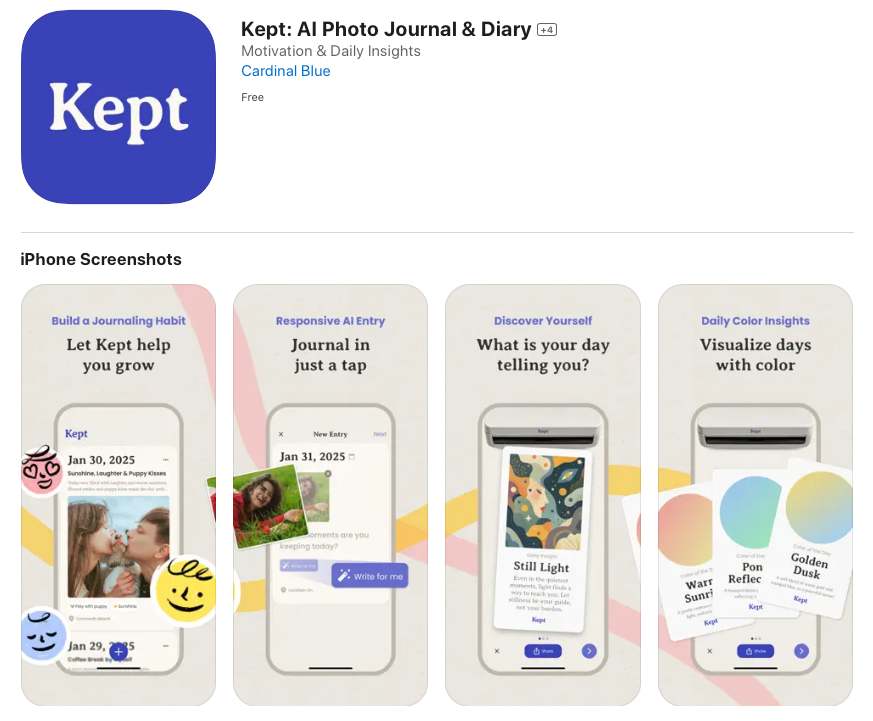
Kept stands out as a revolutionary approach to journaling for those who find traditional writing too time-consuming. This free app simplifies the journaling process to its essence: just upload a photo, and with a single click, you're done—no need to write captions or lengthy entries. What makes Kept special is its AI-powered insight generation, which creates personalized reflection cards based on your visual uploads. These beautifully designed cards can be shared directly to social media, making it perfect for both private reflection and public memory-keeping. If you've struggled to maintain a journaling habit due to time constraints, Kept's frictionless approach might be exactly what you need.
2. Apple Journal: Seamless Integration for iOS Users
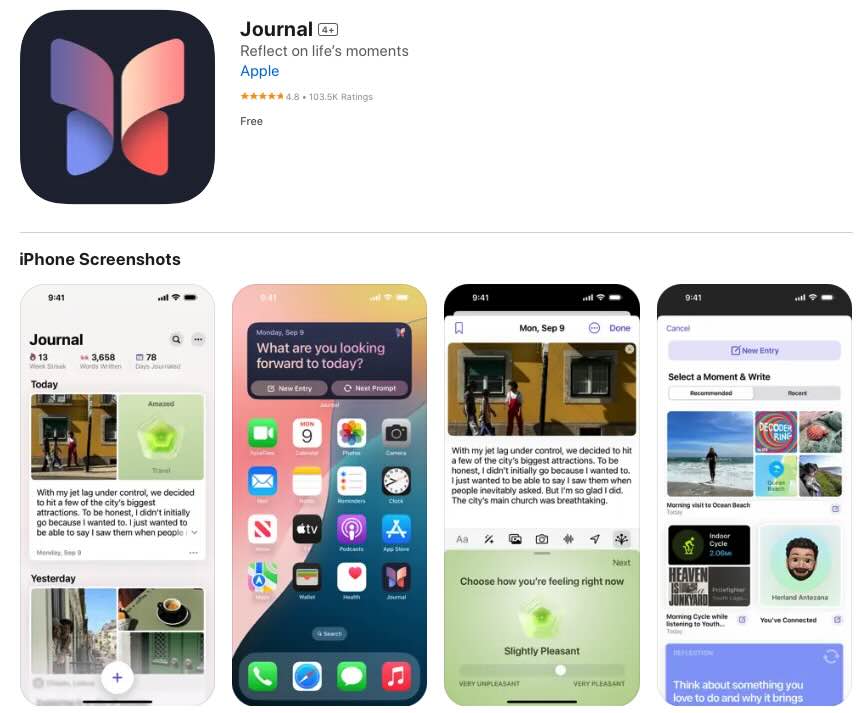
Apple's native Journal app offers a polished, privacy-focused experience that integrates seamlessly with your iPhone's existing capabilities. The app uses on-device intelligence to suggest personalized journaling moments based on your photos, workouts, music, and locations without compromising your privacy.
With support for audio recordings, photos, and voice-to-text, Apple Journal makes capturing multi-dimensional memories effortless. Its "Reflections" feature provides thoughtful prompts based on your activities, while the scheduling function helps establish consistency. For those already invested in the Apple ecosystem, this free app provides a natural extension of your digital life.
3. Day One: The Next Step for Serious Journalers
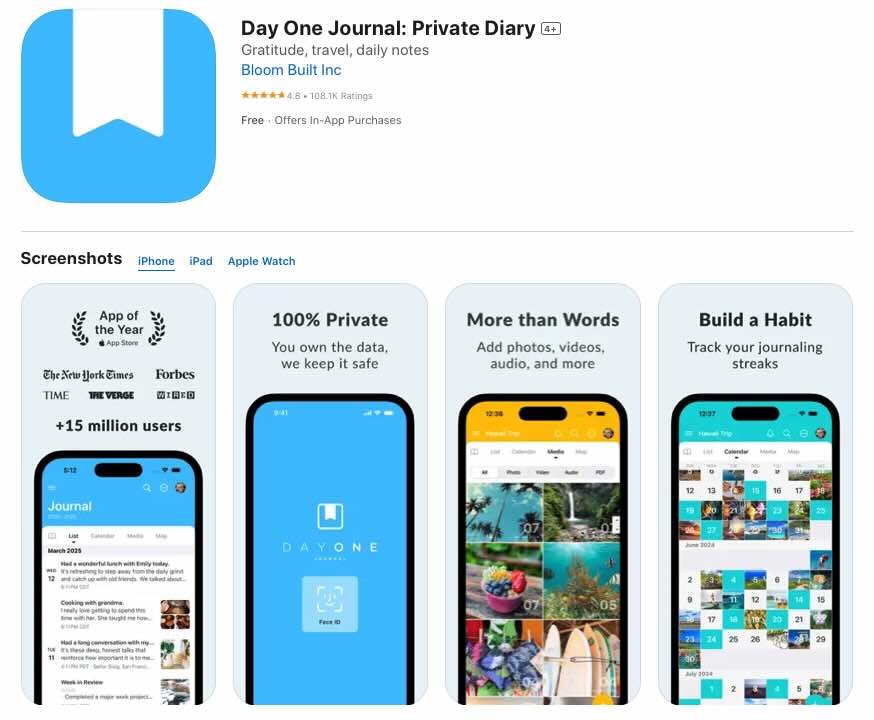
For users seeking depth and versatility, Day One remains the benchmark for digital journaling. This award-winning app supports multiple journals, rich media attachments, and encrypted entries across all your Apple devices. Its standout features include location-based weather data, automated timestamps, and the ability to integrate photos with your written reflections.
The premium version offers audio recording, handwritten entries via Apple Pencil, and detailed activity tracking. While the basic version is free, the subscription unlocks additional features that serious journalers will appreciate. If you're looking for a comprehensive platform that can grow with your practice, Day One offers unmatched flexibility.
Final Thoughts: Your Journey Begins Now
Journaling is one of the most accessible and powerful tools for personal growth available to us. It requires no special talents or expensive equipment—just the willingness to show up on the page and meet yourself with curiosity and compassion.
As you begin or deepen your journaling practice, remember that there's no finish line or perfect outcome. The value lies in the process itself—the regular return to self-reflection and the gradual accumulation of insights that shape your understanding of yourself and your life.
Your journal will become whatever you need it to be: a trusted confidant, a problem-solving workshop, a record of your journey, or simply a quiet space to breathe and be. Whether you choose pen and paper or one of today's innovative digital solutions, the most important step is simply to begin. The page awaits—what will you discover there?


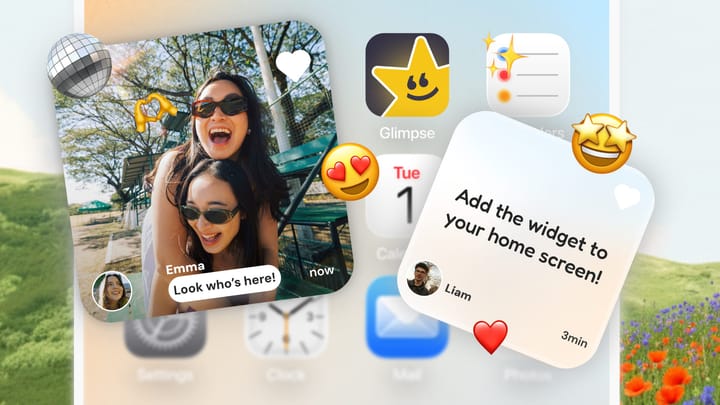


Comments ()